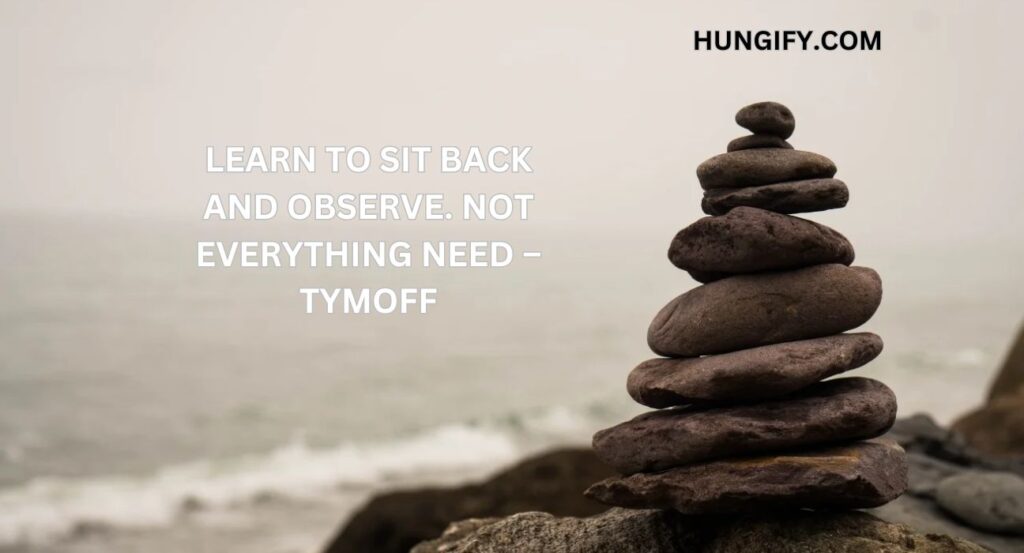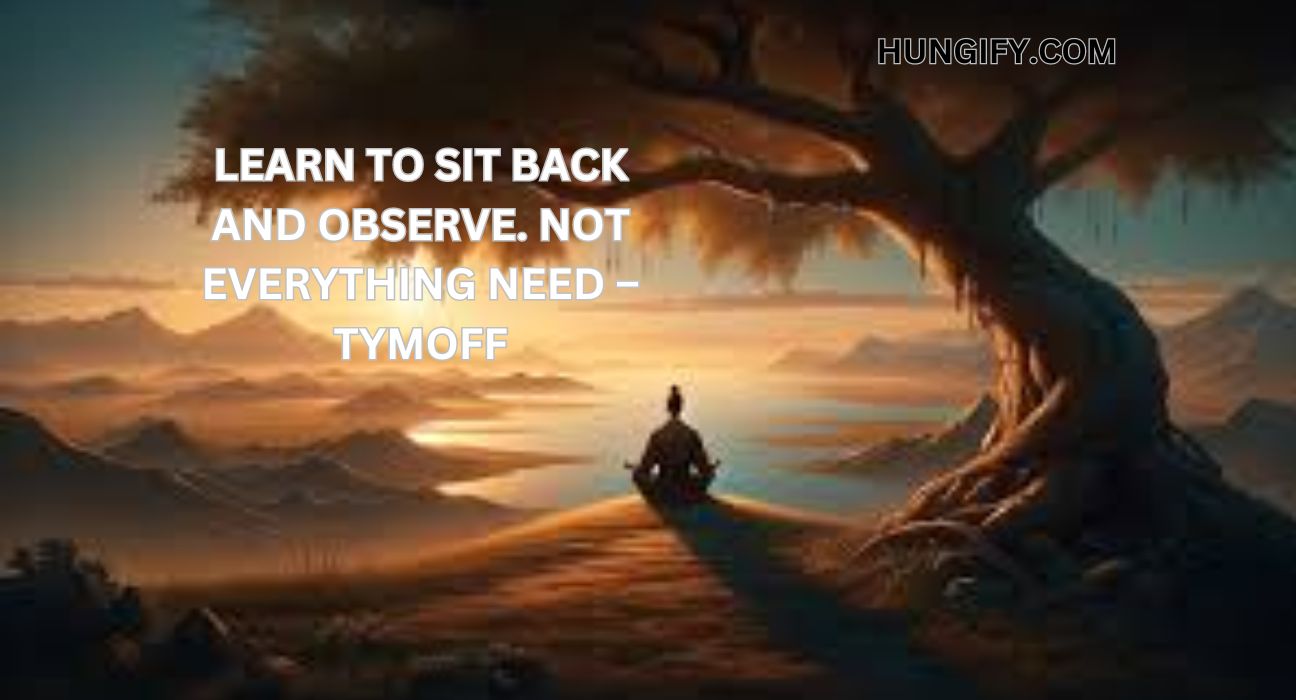Introduction
In our fast-paced world, we often feel the need to react instantly to every situation. However, the ability to learn to sit back and observe is a valuable skill that can lead to a more peaceful and fulfilling life. The phrase ” Learn To Sit Back And Observe. Not Everything Need – Tymoff” emphasizes the importance of taking a step back and understanding the full picture before responding. This article explores the benefits of observation and offers practical tips for incorporating this mindset into your daily life.
Read More: The Ultimate Guide to Color:pfulw6wghmw= White:
The Power of Observation
Understanding the Benefits of Observing
Observation is a powerful tool that allows us to gain insight into situations without the pressure of immediate action. By taking the time to observe, we can see the bigger picture and understand the underlying dynamics at play. This approach helps us make more informed decisions and avoid hasty reactions that we might regret later.
Enhancing Emotional Intelligence through Observation
Learning to sit back and observe can significantly enhance our emotional intelligence. When we observe without immediately reacting, we become more aware of our emotions and those of others. This awareness enables us to respond with empathy and thoughtfulness, rather than impulsivity, improving our relationships and interactions.
The Consequences of Constant Reaction
Increased Stress and Anxiety
Constantly reacting to every situation can lead to increased stress and anxiety. When we feel compelled to respond to every stimulus, we place ourselves under unnecessary pressure. This can result in burnout and decreased well-being. By learning to sit back and observe, we allow ourselves the space to process information calmly and reduce stress.
Strained Relationships and How Observation Helps
Impulsive reactions often cause misunderstandings and conflicts in relationships. When we react without fully understanding the situation, we risk saying or doing things we might later regret. Observing first allows us to approach interactions with greater sensitivity, fostering healthier and more harmonious relationships.
Practical Tips to Develop Observational Skills
Practice Mindfulness in Daily Life
Mindfulness is the practice of being present in the moment without judgment. By cultivating mindfulness, we become more aware of our thoughts and feelings without acting on them immediately. Techniques such as meditation, deep breathing, and mindful walking can help enhance our ability to observe rather than react.
Create a “Pause” Button Before Reacting
Develop the habit of pausing before responding. When faced with a situation that demands a reaction, take a moment to breathe and collect your thoughts. This pause allows you to consider your response more carefully and reduces the likelihood of impulsive reactions.
Reflect on Your Reactions to Improve Future Responses
Spend time reflecting on your past reactions. Identify instances where reacting immediately may have led to negative outcomes. Consider how observing first could have changed the situation. This reflection can help reinforce the importance of observation and guide you in future interactions.
Engage in Active Listening
Active listening is a key component of effective observation. When engaged in conversation, focus fully on the speaker without planning your response. Pay attention to their words, tone, and body language. This practice helps you understand the speaker’s perspective more deeply and respond more thoughtfully.
Limit Distractions to Enhance Focus
In our hyper-connected world, distractions are everywhere. Reduce distractions to improve your observational skills. Set aside specific times to check emails and social media, and create environments conducive to focused attention. This practice helps you remain present and attentive in your daily interactions.

Implementing Observation in Different Areas of Life
In Personal Relationships
In personal relationships, observing can lead to greater empathy and understanding. By taking the time to truly see and hear our loved ones, we can respond to their needs more effectively. This practice fosters deeper connections and reduces unnecessary conflicts.
In the Workplace
In the workplace, observation can enhance decision-making and leadership skills. Leaders who observe before acting are better equipped to understand team dynamics and make informed decisions. This approach also fosters a more collaborative and respectful work environment.
In Social Media Interactions
Social media often amplifies the pressure to react instantly. Practice observation by scrolling through your feed without commenting immediately. Reflect on the content and your potential responses. This practice can help you engage more meaningfully and reduce online conflicts.
Read More: Shared Joy is a Double Joy; Shared Sorrow is Tymoff: Understanding Human Connection
The Long-Term Benefits of Observation
Improved Mental Health
Adopting an observational mindset can lead to improved mental health. By reducing the stress of constant reaction, we create a more peaceful and balanced inner life. This approach helps manage anxiety and promotes overall well-being.
Enhanced Problem-Solving Skills
Observation enhances our problem-solving skills by allowing us to gather more information and consider multiple perspectives. This approach leads to more effective and creative solutions, as we are not limited by our initial reactions.
Greater Life Satisfaction
Ultimately, learning to sit back and observe can lead to greater life satisfaction. By approaching life with mindfulness and reflection, we cultivate a deeper appreciation for the present moment. This practice helps us navigate challenges with grace and enjoy more fulfilling relationships and experiences.
How to Master the Art of Observing
Steps to Start Observing More Effectively
To start observing more effectively, begin by slowing down and paying attention to your surroundings. Practice mindfulness techniques, such as deep breathing or meditation, to help you stay present. Make a conscious effort to pause before reacting and reflect on your responses.
Techniques to Incorporate into Daily Routines
Incorporate observation into your daily routines by setting aside time for quiet reflection or journaling. Practice active listening during conversations, and avoid multitasking to remain focused on the task at hand. These small changes can have a big impact on your ability to observe and respond thoughtfully.
Real-Life Examples of the Power of Observation
Stories and Scenarios Demonstrating the Benefits
There are many real-life examples of how observation can be beneficial. For instance, in a workplace setting, taking the time to observe team dynamics before jumping into a project can lead to better collaboration and outcomes. In personal relationships, observing before reacting can prevent misunderstandings and strengthen bonds.
Learning from Everyday Situations
Everyday situations provide countless opportunities to practice observation. Whether you’re waiting in line at a store or sitting in a meeting, take a moment to observe your surroundings and the people around you. This practice can help you become more attuned to your environment and the emotions of others.

Conclusion
Learning to sit back and observe is a valuable skill that can transform various aspects of our lives. By reducing the impulse to react immediately, we gain clarity, enhance our emotional intelligence, and foster healthier relationships. The wisdom of “Not everything needs a reaction” by Tymoff serves as a powerful reminder to approach life with mindfulness and reflection. Embrace this philosophy and discover the profound benefits of observation in your daily interactions. Through patience and understanding, we can create a more thoughtful, empathetic, and satisfying life.
Read More: Geekzilla Tio Geek: Your Ultimate Guide to Geek Culture
Frequently Asked Questions
What does the phrase “Learn to sit back and observe. Not everything needs a reaction – Tymoff” mean?
- It means that not every situation requires an immediate response. By observing first, you can understand the situation better before reacting.
Why is it important to sit back and observe?
- Sitting back and observing allows you to process information, reduce stress, and make more thoughtful decisions, leading to better outcomes.
How can observing improve emotional intelligence?
- Observing helps you recognize your emotions and those of others, enhancing empathy and enabling more thoughtful responses.
What are the consequences of constant reaction?
- Constant reaction can lead to increased stress, anxiety, and strained relationships due to impulsive decisions.
What practical steps can help develop observational skills?
- Practicing mindfulness, pausing before reacting, and active listening are effective ways to enhance your observational skills.
How does observation benefit personal relationships?
- Observation helps you understand others’ perspectives better, leading to deeper empathy and healthier, more effective communication.
What role does observation play in the workplace?
- In the workplace, observation improves decision-making, leadership skills, and team dynamics by fostering a more thoughtful approach.
How can observing impact social media interactions?
- By observing rather than reacting immediately, you can avoid misunderstandings and engage more meaningfully online.
What are the long-term benefits of adopting an observational mindset?
- Long-term benefits include improved mental health, enhanced problem-solving skills, and greater life satisfaction.
How can one start practicing the art of observation?
- Start by slowing down, being present in the moment, and taking time to reflect before responding to situations.
